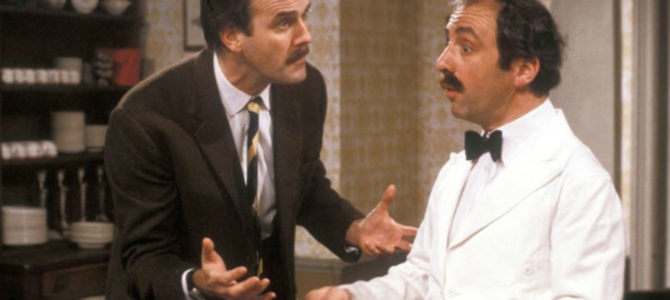In the wake of television shows, movies, and other content being pulled off of their platforms in an effort to satisfy the pressure from the Black Lives Matter movement, actor John Cleese spoke out against the removal of a “Fawlty Towers” episode.
Editors and networks have adjusted their content in recent weeks to adhere to the demand for racial sensitivity. BBC followed suit in pulling the episode “The Germans” off of their commercial subsidiary, UKTV streaming service, for featuring racially offensive language.
The 1975 episode presented one of its characters, Mayor Gowen, using racial language, including saying the N-word three times, in a conversation with Cleese’s character regarding the West Indies cricket team. BBC removed this part of the episode in 2013, creating a more modern, less offensive version of the show. UKTV, however, was still airing the original episode.
Although Cleese expressed his support for the Black Lives Matter movement in an interview with “The Age,” he argued the episode doesn’t contribute to discrimination.
“The Major was an old fossil left over from decades before. We were not supporting his views, we were making fun of them. If they can’t see that, if people are too stupid to see that, what can one say?” Cleese said.
UKTV announced on Twitter the episode is down temporarily to go under review. The company wrote, “we want to take our time to consider our options for this episode.”
The trend of censoring content for purposes of racial sensitivity has increased significantly since the beginning of the protests following the death of George Floyd nearly three weeks ago. Pressure from protesters has caused many organizations to reevaluate their past work. And those who haven’t adhered to the trend have paid the price.
Former editorial page editor of the New York Times James Bennet was forced to resign after publishing an op-ed from the republican Sen. Tom Cotton. Bennet resigned after apologizing for running the article. According to a New York Times article covering the resignation, Bennet said he realized after-the-fact the piece contained a “needlessly harsh” tone.
With potential for job loss and public embarrassment and coercion, many networks have been forced to consider their shows. Cleese criticized BBC for conforming for this reason.
“A lot of the people in charge now at the BBC just want to hang onto their jobs,” he said. “If a few people get excited they pacify them rather than standing their ground as they would have done 30 or 40 years ago.”
Cleese further criticized the wisdom of BBC for making such a move that hinders the point of the show, happiness and entertainment, for the purpose of their own protection.
“’Fawlty Towers’ has given a large number of people a great deal of happiness, why would you want to stop that?”









